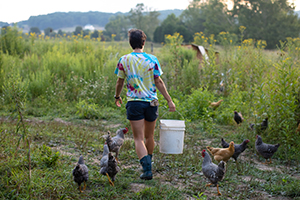It’s Ag Census Time!
Promoting common-sense policies for diversified food systems
It’s that time again … farmers, ranchers, hobby farmers, and homesteaders are getting a thick packet from the USDA with a very long list of questions. It’s the National Agricultural Statistical Service’s (NASS) census of agriculture.
Given the instances of government harassment of small farmers, any request by the USDA for people’s information understandably causes concern! And the sheer volume and intrusiveness of the questions make that worse.

However, the agency cannot legally use the information you provide for anything other than statistical purposes; and it cannot bring an enforcement action or otherwise target you based on your census responses (more details below).
Having these sorts of statistics is valuable for small-scale farmers and our movement. Legislators often look to see what sort of farms (if any) are in their districts, so this information has an impact on how elected officials view agricultural issues. These statistics can be important in debates over public policy on agriculture and food.
So, what exactly is this all about?
The USDA is required by statute to conduct a census of agriculture every five years. The census covers anyone with a farm. The definition of a farm is “any place that produced and sold, or normally would produce and sell, $1,000 or more of agricultural products during the census year.” (The regulations governing the NASS are available at USDA – National Agricultural Statistics Service – About NASS – Regulations Guiding NASS.)
The agency develops its mailing list for the census through a variety of sources, including many private sources that share their information, such as some agricultural-related magazines. (NOTE: FARFA and CHFS never share our lists, out of respect for your privacy.)
Under federal law, any information provided in response to the survey or census is to be used only for statistical purposes. In other words, the NASS division of USDA cannot share your individual responses with the IRS, other agencies, or even with the enforcement branches of USDA.
The USDA will compile the information collected and release statistics on how many people farm, how many acres are in organic production, how many livestock are owned by different size farms, and much more. The information published is not connected to any person’s name or personal information. You can see the results from the last census at List of Reports and Publications | 2017 Census of Agriculture | USDA/NASS.
On the front of the survey, it states that your responses are required by law. A federal statute requires individuals to respond to questions presented to them as part of the census. The statutory penalty for not responding is a $100 fine, while willfully supplying false information can result in a fine up to $500. To our knowledge, the USDA has never brought an enforcement action or fined anyone for failing to respond to the census. (Which also means that the constitutionality of this requirement has never been tested in court.)
What are my options?
Below are three different courses of action in response to the census. This is NOT legal advice. It is provided for your information only; please consult an attorney in your state if you have any legal questions.
1) You can decide not to respond at all. This violates the statute, but USDA has never fined anyone under it. If you don’t respond, you are likely to receive duplicate copies in the mail, a phone call from the USDA, and possibly even an in-person visit.
2) If you do not want to provide any information to the USDA, another option is to mail the census form back with a note stating that you decline to respond. Although this also violates the statute, USDA officials have stated that they will drop the matter at that, and they have always done so to date. (Note: if you don’t meet the definition of “farm” above, then your note can say simply that.)
3) You can respond by answering whichever questions you are willing to – and leave any questions that you don’t want to respond to blank. This will allow the information that you’re willing to share to be included in the statistics about farming in our country.
MORE INFORMATION
You can read the statute that governs the Agricultural Census at https://www.law.cornell.edu/uscode/text/7/2204g.
All of the regulations are posted at: USDA – National Agricultural Statistics Service – About NASS – Regulations Guiding NASS. Note that there is an entire section on the issue of confidentiality and security of the data.
SUPPORT FARFA
Never has our work been more important than now! More and more people are awakening to the fact that our food systems are broken. There is no better time to change the rules that favor Big Agribusiness and Big Food over small-scale, local producers.
Your support for our work TODAY can make an enormous – and long-lasting – difference! Please consider joining or making a donation to FARFA and protect a healthy and productive food supply for everyone.
Also, you can make sure we have your correct zip code so we can provide you with alerts that are specific to your state or legislative district. And when we send out email alerts to contact your legislators, a simple click on a link in that email will show you the names and contact info for YOUR specific legislators … all because we have your zip code. Just go to our Self-Service Portal to check your contact record.